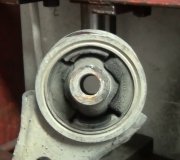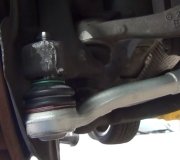This is a pretty common problem and is caused by failure to use a torque wrench on the lug nuts. The torque specs are published for all car and light truck models, and all shops have wall charts or books for quick reference. At the dealership I used to work at, if you got caught not using a torque wrench, you got a verbal warning the first time. The second time you were invited to find a job somewhere else. It's that big of a deal because it can land the shop owner in court.
The reasons for torquing lug nuts include, 1) the studs, nuts, and wheel won't be damaged, 2) the nuts won't work loose, 3) brake drums and rotors won't be warped from uneven clamping forces, and 4) a 90-pound driver can get the nuts loose to change a flat tire.
The problem is a lot of the time the damage was done by the previous mechanic but doesn't show up until the next time the wheel has to be removed. This applies in particular to over-tightening the lug nuts. That can peel the threads and destroy the nuts, but they won't come loose. In fact, it's when the next person tries to get them off that the damaged threads tear up both the nut and the stud. Naturally the owner blames that mechanic because they weren't aware there was a problem before, but the blame belongs on the previous mechanic.
The shop was right to replace the wheel too. Over-tightening the nuts deforms the tapered contact point for the nut. That area has to match the nut perfectly for that friction surface to hold the nut from working loose. Under-tightening the nuts allows them to slide around and grind that contact surface away. Once that happens, even the correct torque on the nuts won't prevent them from repeatedly working loose. That is a common cause of wheels coming loose every few miles to few days.
Cast aluminum wheels are even less forgiving. If the nuts are over-tightened even once, that contact surface is destroyed.
Monday, June 23rd, 2014 AT 11:07 PM


